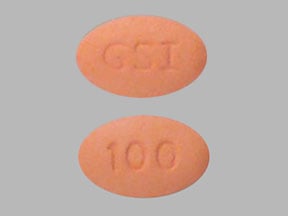
Zydelig Coupons & Savings Card – Discount Prices from $15988.66
My prescription
Edit
100MG, Zydelig (60 Tablets)
Select pharmacy

Albertsons
$15988.66
COUPON PRICE
Walmart
$16055.08
COUPON PRICE
Walgreens
$16066.07
COUPON PRICEZydelig savings card
Show this card to your pharmacist
Albertsons
$15988.66
BIN
ID
PCN
GRP
019876
LH49226032
CHIPPO
LHX
Powered by
Related kinase inhibitors prescriptions
Related kinase inhibitors prescriptions
Price history for Zydelig
60 Tablets, 100MG
Average retail price for Zydelig
Average SaveHealth price for Zydelig
Our price history data is based on aggregated prescription data collected from participating pharmacies in America. Our prescription data updates daily to reflect the latest price changes. If you notice a missing data point, it means there wasn't sufficient data available to generate a monetary value for that date.
*Retail prices are based on pharmacy claims data, and may not be accurate when we don't have enough claims.
Zydelig dosage forms
Dosage Quantity Price from Per unit 100MG 60 Tablets $15988.66 $266.48 150MG 60 Tablets $15988.66 $266.48
| Dosage | Quantity | Price from | Per unit |
|---|---|---|---|
| 100MG | 60 Tablets | $15988.66 | $266.48 |
| 150MG | 60 Tablets | $15988.66 | $266.48 |
Zydelig Warnings
Idelalisib is associated with several serious health risks, and it is important to be aware of these while undergoing treatment. Below are potential risks and precautions to consider:
Liver Health: Idelalisib may lead to severe, potentially fatal liver damage. Regular liver function tests will be conducted by your healthcare provider. Be vigilant and report immediately if you experience persistent nausea or vomiting, loss of appetite, stomach or abdominal pain, jaundice (yellowing of eyes or skin), or dark-colored urine.
Gastrointestinal Concerns: This medication may cause severe diarrhea and, in rare cases, a gastrointestinal perforation. Contact your doctor promptly if you experience persistent diarrhea, abdominal or stomach pain, cramping, blood or mucus in your stool, fever, nausea, vomiting, or any signs of dizziness or fainting.
Lung Issues: Idelalisib can induce serious lung problems, including pneumonitis, which can be life-threatening. Notify your healthcare provider immediately if you notice symptoms such as a worsening cough, shortness of breath, difficulty breathing, or wheezing.
Infection Risk: Your immune response may be compromised, increasing susceptibility to serious infections, which can occasionally be fatal. Your doctor might prescribe antibiotics to prevent infections during and after your treatment. Adhere strictly to all instructions given by your healthcare provider. Seek urgent medical attention if you develop symptoms like a persistent sore throat, fever, chills, cough, or any new or worsening swelling of lymph nodes.
Your safety is paramount, and following these precautions diligently can help manage the risks associated with Idelalisib. Always communicate openly with your healthcare provider about any concerns or symptoms you experience.
Zydelig Side Effects
When taking this medication, some common side effects may include diarrhea, headache, heartburn, mouth or throat sores, and difficulty sleeping. These are generally mild, but if they persist or worsen, it is important to inform your healthcare provider. Among the more serious side effects are easy bruising or bleeding, swelling in the hands, ankles, or feet, and sudden changes in vision. Immediate medical attention is recommended if any of these occur. While a rash is a common side effect that is typically not severe, it can sometimes indicate a more serious condition. Seeking medical advice is crucial if a rash develops. Idelalisib can also weaken the immune system, increasing the risk of infections, including a rare but potentially fatal brain infection known as progressive multifocal leukoencephalopathy (PML). Symptoms of PML such as clumsiness, loss of coordination, weakness, sudden changes in thinking, difficulty talking or walking, and seizures require urgent medical care. Although a severe allergic reaction to this drug is rare, it is essential to seek immediate help if symptoms such as a rash, itching, swelling of the face, tongue, or throat, severe dizziness, or difficulty breathing occur. This overview does not cover all possible side effects, so if other symptoms arise, contacting a healthcare professional is advised.
Zydelig Interactions
What is Zydelig used for?
Zydelig is used for the treatment of certain types of blood cancers, specifically chronic lymphocytic leukemia (CLL), follicular B-cell non-Hodgkin lymphoma (FL), and small lymphocytic lymphoma (SLL). It is typically prescribed for patients who have received at least one prior therapy.
Is Zydelig still on the market?
Yes, Zydelig (idelalisib) is still on the market. It is used for the treatment of certain types of blood cancers. However, it is important for patients to discuss with their healthcare provider about its use, as it may have specific indications and potential side effects.
Is Zydelig chemotherapy?
Zydelig (idelalisib) is not classified as traditional chemotherapy. It is an oral medication that belongs to a class of drugs known as kinase inhibitors. It specifically targets certain proteins involved in the growth and survival of cancer cells, making it a targeted therapy rather than conventional chemotherapy.
How much does Zydelig cost?
The cost of Zydelig can vary based on factors such as the pharmacy, location, insurance coverage, and dosage. It is recommended to contact a local pharmacy or healthcare provider for the most accurate and up-to-date pricing information. Additionally, patients may explore patient assistance programs or insurance plans that could help reduce the cost.
What is the drug Idelalisib used for?
Idelalisib is used for the treatment of certain types of blood cancers, including chronic lymphocytic leukemia (CLL), follicular B-cell non-Hodgkin lymphoma, and small lymphocytic lymphoma (SLL). It is typically used in patients who have received prior therapies.
